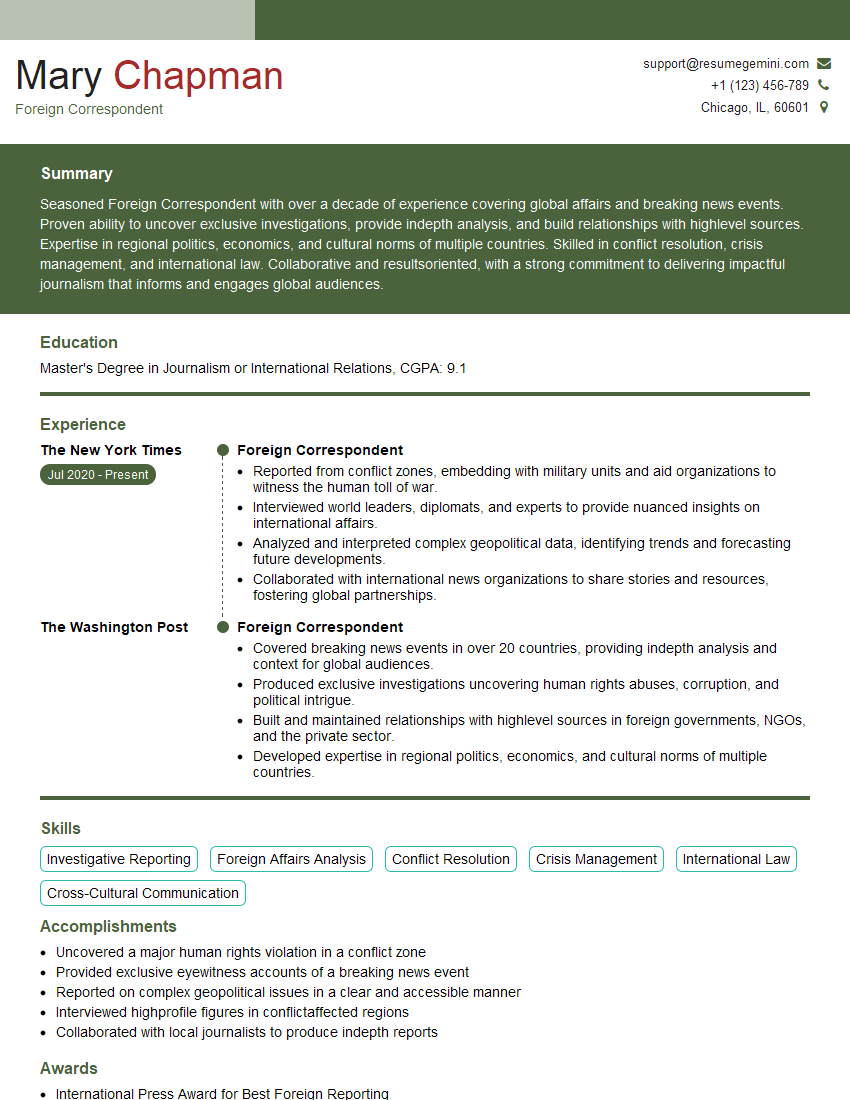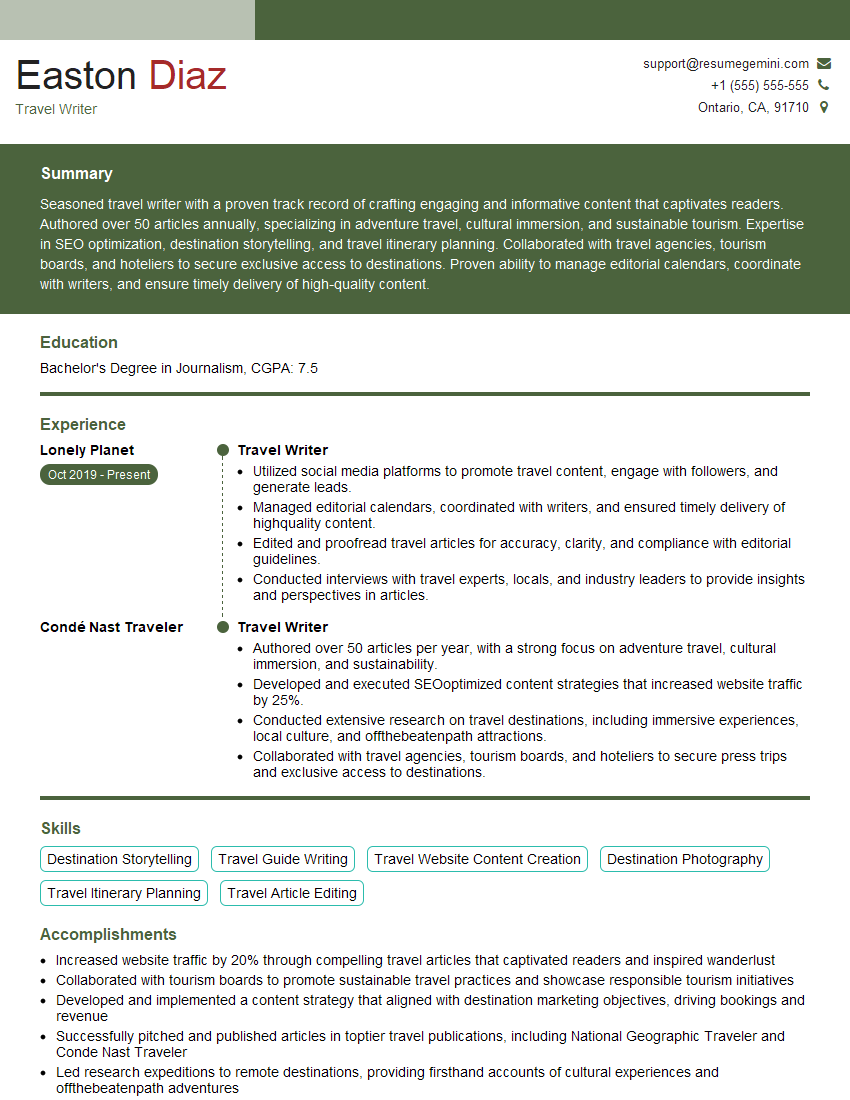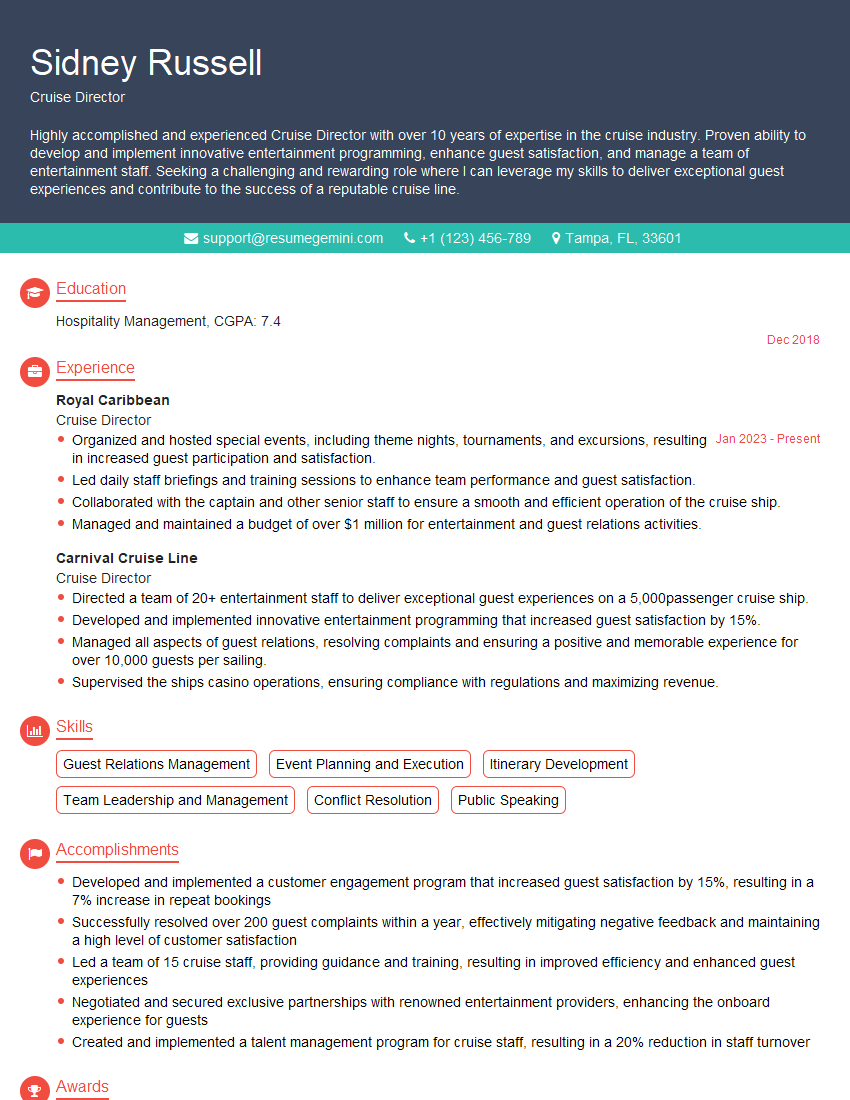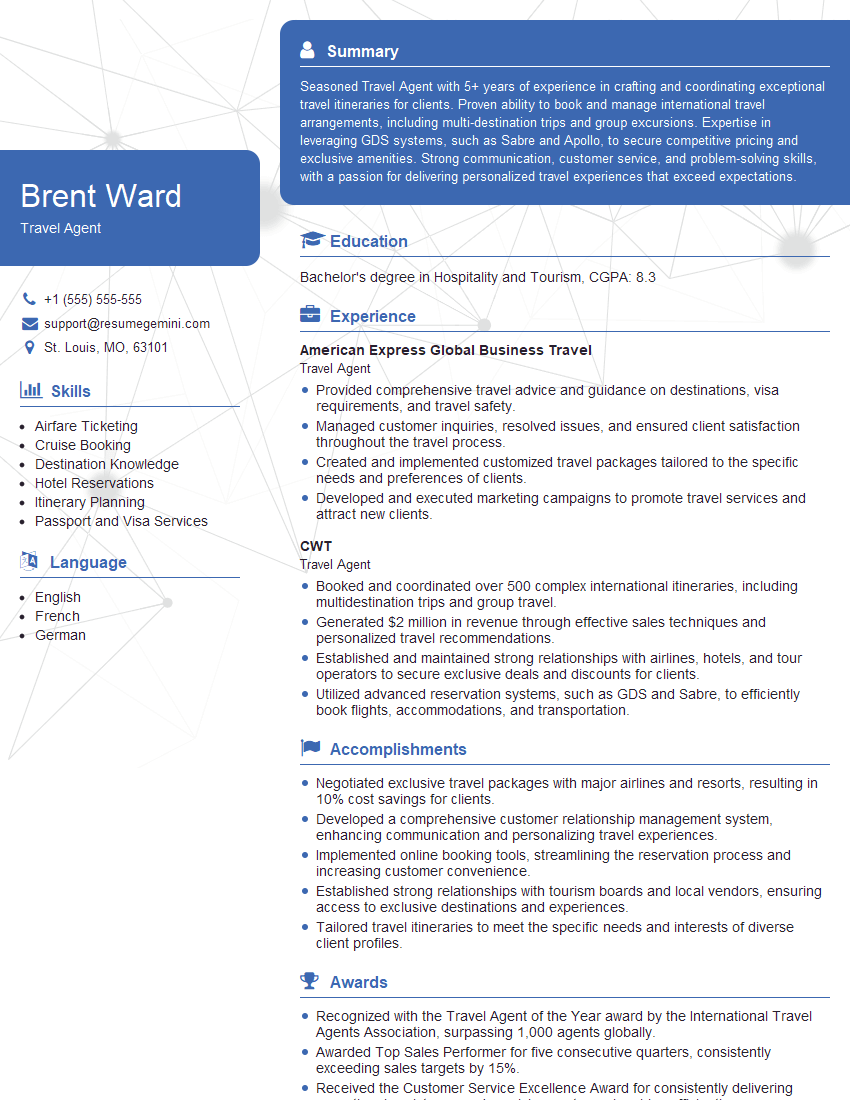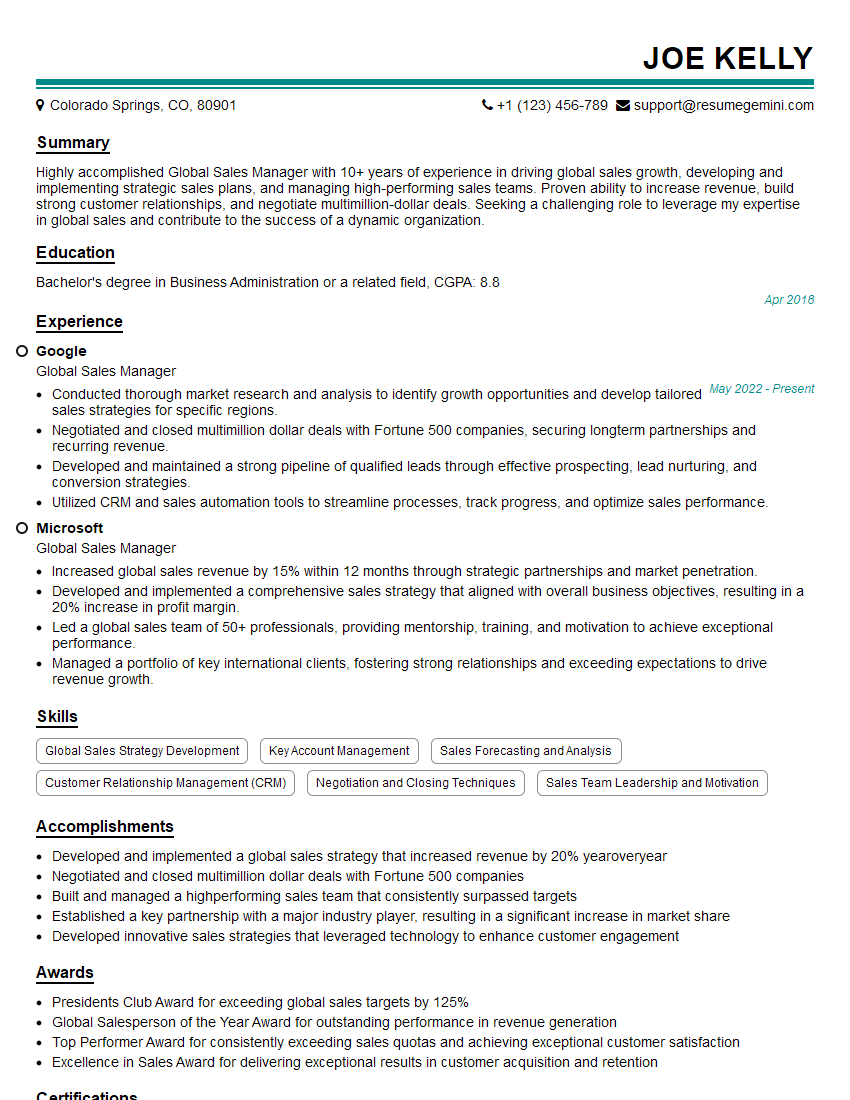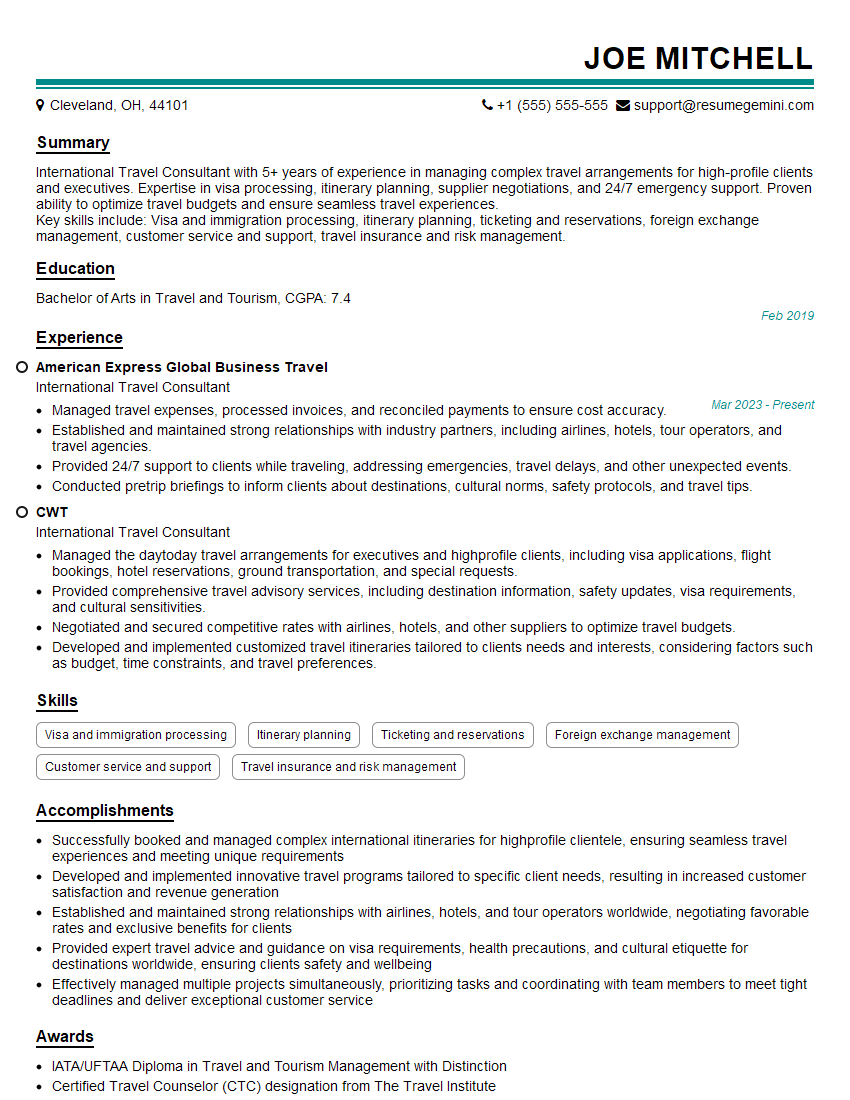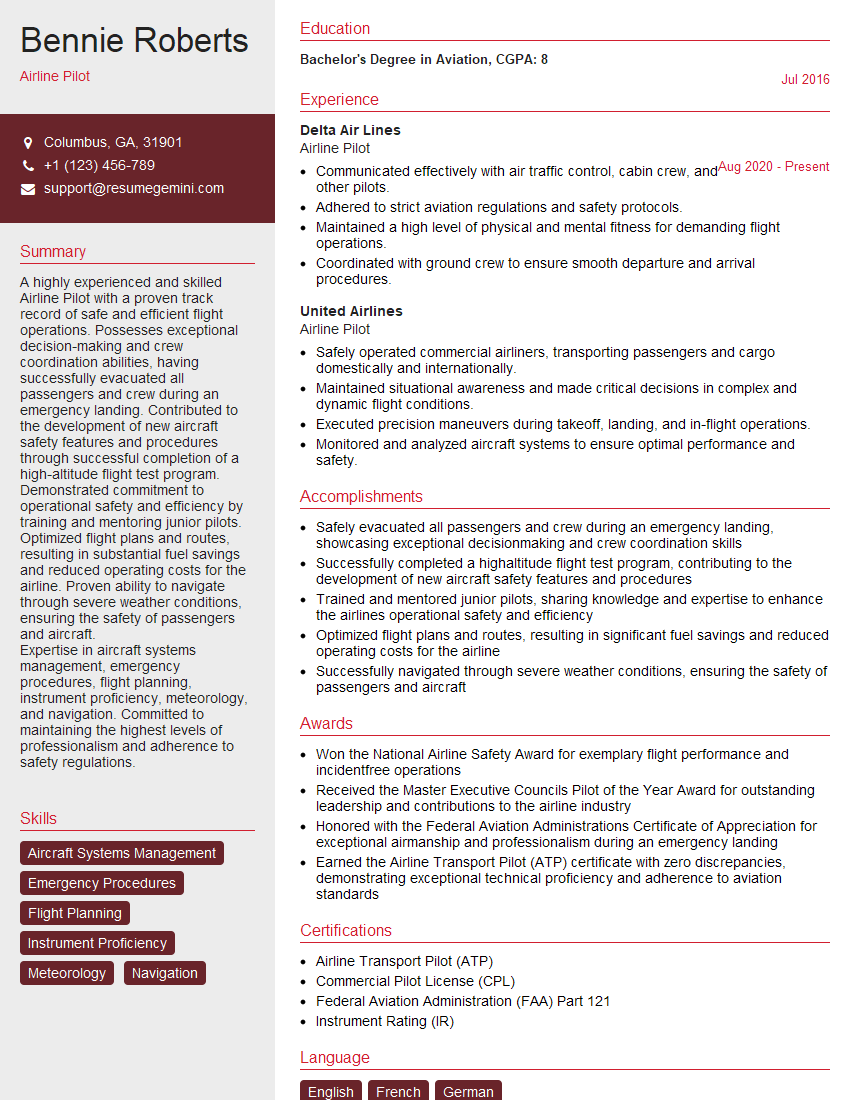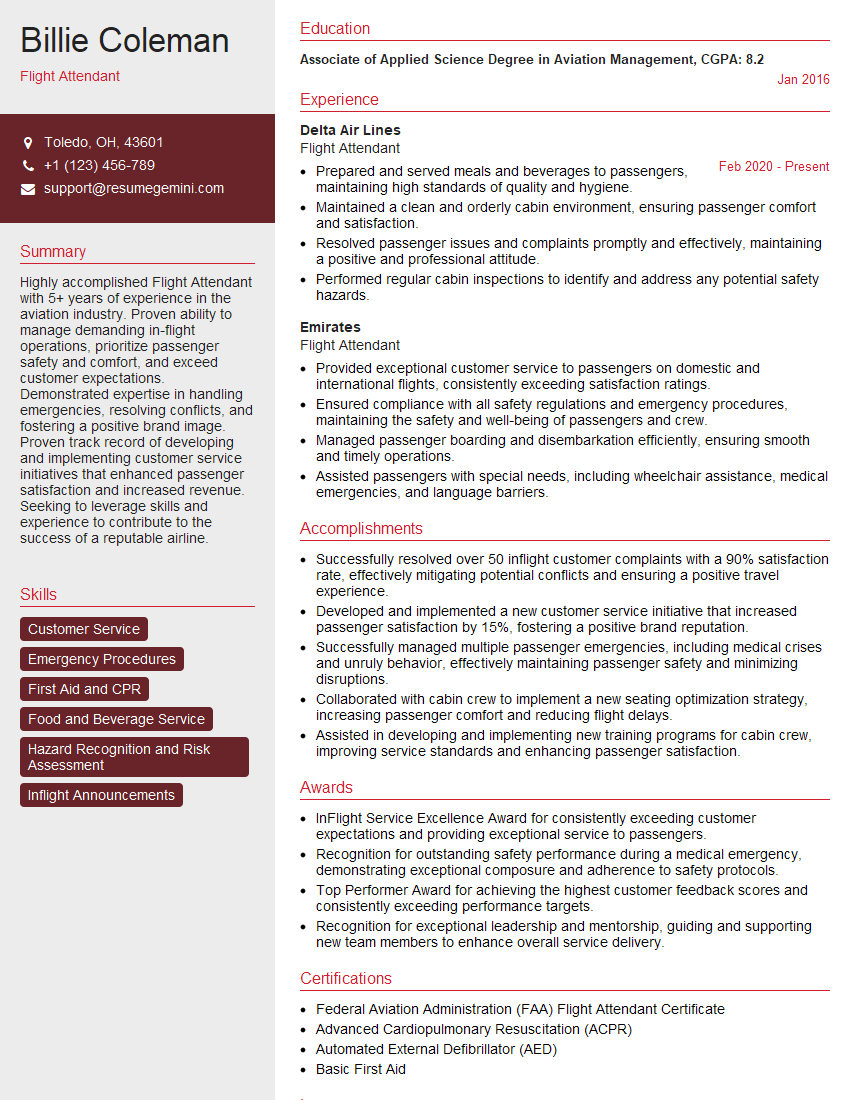Warning: search_filter(): Argument #2 ($wp_query) must be passed by reference, value given in /home/u951807797/domains/techskills.interviewgemini.com/public_html/wp-includes/class-wp-hook.php on line 324
The thought of an interview can be nerve-wracking, but the right preparation can make all the difference. Explore this comprehensive guide to Globetrotting interview questions and gain the confidence you need to showcase your abilities and secure the role.
Questions Asked in Globetrotting Interview
Q 1. Describe your experience managing international travel logistics.
Managing international travel logistics involves orchestrating a complex interplay of factors to ensure smooth and efficient journeys. It’s akin to conducting a symphony, where each instrument (flight bookings, accommodation, transportation, visas, etc.) must play in harmony. My experience encompasses end-to-end management, from initial itinerary planning and budget allocation to on-the-ground support and post-trip reporting.
For example, I recently planned a multi-city tour for a research team across Southeast Asia. This involved securing international flights with optimal connections, booking accommodations that met specific research needs (e.g., proximity to study sites, reliable internet access), arranging local transportation (taxis, private drivers, train tickets), and coordinating in-country logistics such as meeting local collaborators and securing necessary permits.
My approach emphasizes proactive risk mitigation. This includes securing travel insurance, developing contingency plans for flight delays or unforeseen circumstances, and maintaining constant communication with travelers throughout their journey. I leverage specialized travel management software to track bookings, manage expenses, and ensure seamless communication.
Q 2. How proficient are you in handling visa applications and immigration procedures?
My proficiency in handling visa applications and immigration procedures is extensive. I possess a deep understanding of the varying requirements across different countries, including the nuances of specific visa types (tourist, business, work, student, etc.). I’m adept at navigating complex application processes, preparing comprehensive documentation, and proactively addressing any potential issues that might arise.
I’ve successfully processed hundreds of visa applications across various countries, ensuring timely submission and securing approvals for my clients. This includes navigating the complexities of national and regional regulations, understanding specific requirements for different nationalities, and managing potential delays or rejections. For instance, I assisted a client in obtaining a specialized research visa for Japan, a process requiring meticulous documentation and extensive communication with Japanese embassy officials.
Beyond applications, I provide guidance on immigration regulations, customs procedures, and other border-crossing formalities, ensuring a smooth and compliant travel experience.
Q 3. What strategies do you employ for effective cross-cultural communication?
Effective cross-cultural communication is paramount in globetrotting. It’s about understanding and respecting diverse perspectives, communication styles, and cultural norms. My strategy is built on a foundation of active listening, empathy, and cultural sensitivity. I strive to understand the context behind communication, paying attention to both verbal and non-verbal cues.
I invest time in learning about the customs and traditions of different cultures before engaging with individuals from those backgrounds. This includes learning basic phrases in local languages to demonstrate respect and build rapport. For example, before leading a team to conduct fieldwork in rural communities in Peru, I spent several weeks studying Quechua, the local language. This greatly improved our interactions and facilitated deeper engagement with the local population.
I also adapt my communication style to the specific cultural context, avoiding misunderstandings by paying attention to differences in directness, formality, and nonverbal communication such as eye contact and personal space.
Q 4. Explain your experience with international relocation services.
My experience with international relocation services encompasses every aspect, from pre-departure planning to post-arrival support. This includes assisting individuals and families with visa applications (as described previously), arranging housing and schooling, facilitating the shipment of personal belongings, and providing cultural orientation and integration support.
For instance, I recently managed the relocation of a family to London from the United States. This entailed securing suitable housing, enrolling their children in international schools, managing the shipment of their household goods, and assisting them with opening bank accounts and obtaining necessary documentation in the UK. I also provided them with a comprehensive guide to British culture and lifestyle to help them settle into their new surroundings.
I understand the emotional and logistical complexities of relocation and strive to create a smooth and supportive transition for every client, minimizing stress and maximizing a sense of welcome and belonging.
Q 5. How do you manage time zone differences and scheduling conflicts across multiple locations?
Managing time zone differences and scheduling conflicts across multiple locations requires meticulous planning and effective communication tools. I utilize project management software and collaborative platforms to maintain a clear overview of schedules and deadlines, accounting for the time differences between various locations.
For example, I use a shared calendar that incorporates different time zones, so all team members can instantly see scheduled meetings and deadlines irrespective of their location. I also utilize communication tools like instant messaging and video conferencing to maintain consistent real-time communication and avoid delays due to time differences. Strategic scheduling, such as scheduling meetings during overlapping work hours, is also crucial.
Clear communication about timelines and expectations is vital. I always confirm meeting times in the participants’ local time to eliminate confusion and ensure everyone understands the schedule. Flexibility is also key; I am willing to adapt meeting times to accommodate the schedules of those in different time zones.
Q 6. Describe your experience with international payment systems and currency exchange.
Experience with international payment systems and currency exchange is essential for seamless financial management in global operations. I’m proficient in utilizing various international payment gateways, understanding currency exchange rates, and managing associated fees and risks. I’m familiar with methods like SWIFT transfers, PayPal, Wise, and other specialized international payment processors.
For a recent project involving payments to multiple international contractors, I carefully selected payment methods minimizing transaction costs and ensuring timely payments in the contractors’ preferred currencies. I used currency exchange rate forecasts to mitigate potential financial losses due to fluctuations. I meticulously track all financial transactions and maintain accurate records for auditing purposes.
Understanding the intricacies of international finance, including tax implications and compliance regulations in various jurisdictions, is critical for responsible financial management in global contexts. I always ensure that transactions comply with all relevant rules and regulations.
Q 7. What are your preferred methods for international communication and collaboration?
My preferred methods for international communication and collaboration prioritize efficiency, clarity, and accessibility. I primarily rely on digital tools such as video conferencing (Zoom, Google Meet), instant messaging (Slack, Microsoft Teams), and project management software (Asana, Trello). These tools facilitate real-time collaboration, regardless of geographical location.
For asynchronous communication, email remains a valuable tool for formal documentation and detailed updates. However, I emphasize clear, concise messaging to avoid misinterpretations. For more informal updates and quick questions, instant messaging proves more efficient.
In situations involving sensitive information or complex discussions, I prefer video conferencing to foster a more personal and engaging connection, and minimize the risk of misunderstandings caused by text-based communication alone. The choice of communication method is always tailored to the situation, audience, and message.
Q 8. How do you adapt your communication style to diverse cultural contexts?
Adapting communication styles across cultures is crucial for effective globetrotting. It’s not just about language; it’s about understanding and respecting nonverbal cues, communication styles, and cultural norms. I approach this by employing a three-pronged strategy: research, observation, and adaptation.
- Research: Before any trip, I thoroughly research the cultural nuances of my destination. This includes understanding typical communication styles (direct vs. indirect), appropriate levels of formality, the importance of non-verbal communication (eye contact, personal space), and potential language barriers.
- Observation: Upon arrival, I carefully observe how locals communicate with each other. This provides invaluable insights into unspoken rules and preferred communication styles. I pay attention to body language, tone of voice, and conversational flow.
- Adaptation: Based on my research and observations, I adjust my communication accordingly. This might involve slowing down my speech, using simpler language, being more patient, or adjusting my body language to match the cultural norms. For example, in some cultures, direct eye contact is a sign of respect, while in others, it can be considered aggressive. I always strive for clear, concise communication while remaining mindful of cultural sensitivities.
For example, during a business trip to Japan, I learned the importance of bowing as a greeting and the emphasis on indirect communication. Instead of directly stating disagreement, I focused on finding common ground and expressing my opinion respectfully and subtly.
Q 9. Describe a challenging international travel experience and how you overcame it.
One challenging experience was during a trip to rural Nepal. I was working on a development project and a sudden landslide blocked the only road to the nearest town, stranding our team. This meant no communication with the outside world, limited supplies, and considerable uncertainty.
Overcoming this involved several steps:
- Maintaining calm and assessing the situation: I immediately convened a team meeting to assess our resources (food, water, medical supplies) and identify potential risks.
- Communicating effectively: We used satellite phones (fortunately we had one) to contact our headquarters and inform them of the situation. We also established a communication plan within the team to manage expectations and ensure everyone felt safe and informed.
- Seeking local help: We collaborated with local villagers who had experience navigating the terrain and provided crucial support in finding alternative routes and ensuring our safety.
- Problem-solving: We worked together to find alternative paths to get our supplies replenished and eventually a rescue team arrived after we made contact with the appropriate authorities.
This experience taught me the importance of preparedness, resourcefulness, and collaborative problem-solving in unexpected situations. It reinforced the need for comprehensive pre-trip planning, including communication and contingency plans.
Q 10. What are some common pitfalls to avoid when traveling internationally for business?
Several pitfalls can hinder international business travel. Avoiding them requires careful planning and cultural sensitivity.
- Ignoring cultural differences: Failing to understand local customs, etiquette, and communication styles can severely impact business interactions. For example, gift-giving customs vary widely and inappropriate gifts can be highly offensive.
- Poor language skills: Even if you use a translator, a basic understanding of the local language shows respect and can improve communication. Misunderstandings due to language barriers can damage relationships and business deals.
- Lack of pre-trip research: Neglecting to research visa requirements, local laws, and business practices can lead to delays, legal issues, or simply missed opportunities. Thorough research is crucial for efficient and successful trips.
- Insufficient networking: International business relies heavily on building relationships. Failing to establish strong contacts before the trip can limit your success and access to opportunities.
- Overlooking logistical details: Not accounting for time differences, travel time, and unexpected delays can disrupt meetings and damage productivity. Meticulous planning of the itinerary, including buffer time, is essential.
For example, a lack of understanding of local business etiquette in a country that highly values hierarchy could lead to serious misunderstandings or offense, ultimately jeopardizing a potential deal.
Q 11. How familiar are you with various international travel insurance options?
I’m very familiar with various international travel insurance options. They range from basic coverage for trip cancellations and medical emergencies to comprehensive packages including baggage loss, personal liability, and even emergency evacuation. The choice depends on the trip’s nature, duration, and your risk tolerance.
Key aspects I consider include:
- Coverage type: Basic, comprehensive, or specialized (e.g., adventure travel).
- Geographic coverage: Ensuring the policy covers your destinations.
- Medical expenses coverage: This is crucial, especially for trips to regions with high healthcare costs.
- Emergency evacuation coverage: Essential for remote or high-risk destinations.
- Pre-existing condition coverage: Important if you have any health concerns.
- Claim process: Check how easy it is to file a claim and how quickly the insurance provider responds.
I typically compare policies from several reputable providers to find the best value for my specific needs. I also always thoroughly read the policy documents to understand the terms and conditions before purchasing.
Q 12. Explain your experience with international health and safety protocols.
My experience with international health and safety protocols involves a multifaceted approach focusing on both proactive preparation and responsive action during travel.
Proactive measures include:
- Vaccination: I consult with my physician and/or travel clinic well in advance of any trip to determine necessary vaccinations and recommended preventative medications based on my itinerary.
- Health awareness: I research the local health risks at my destination, including food and water safety, insect-borne illnesses, and prevalent diseases. This allows me to take appropriate precautions.
- Packing: My travel kit always includes a well-stocked first-aid kit, any necessary prescription medications, and copies of my medical records.
- Safety awareness: I research local laws and regulations, potential security risks, and recommend strategies for personal safety, such as avoiding unsafe areas and being aware of my surroundings.
Responsive actions during travel:
- Seeking medical attention promptly: I know where to access reputable medical care in my destinations and have a plan for communicating with local healthcare providers.
- Reporting incidents: I always promptly report any incidents to the appropriate authorities (local police, embassy) and follow their instructions.
- Following local guidance: I diligently follow any health and safety advisories issued by local authorities or my own country’s government.
For example, during a trip to South America, I ensured all necessary vaccinations were administered, and I practiced strict food and water hygiene protocols to minimize the risk of contracting waterborne illnesses.
Q 13. What software or tools do you utilize for managing international travel itineraries?
For managing international travel itineraries, I utilize a combination of software and tools, selecting the best fit depending on the trip’s complexity and purpose.
- TripIt: I use TripIt to centralize all my travel plans, including flights, hotels, rental cars, and activities. It automatically creates a master itinerary and sends it to me, allowing for easy access and sharing with colleagues or family.
- Google Calendar: I use Google Calendar to schedule meetings, appointments, and set reminders for important tasks during my travels.
- Google Maps: This is invaluable for navigation, especially in unfamiliar cities. It provides real-time traffic updates and offline map access.
- Expense tracking apps: Apps like Expensify help me track expenses, generate reports, and simplify the reimbursement process.
- Project management tools: For complex business trips, I often use project management tools like Asana or Trello to organize tasks, collaborate with team members, and ensure smooth execution of projects.
The specific tools I choose depend on the type of trip. For a simple leisure trip, TripIt and Google Maps might suffice. For a more complex business trip involving multiple stakeholders and tasks, I’d leverage a combination of tools for comprehensive planning and management.
Q 14. How do you ensure compliance with international laws and regulations during travel?
Ensuring compliance with international laws and regulations is paramount during travel. My approach involves careful pre-trip planning, on-the-ground vigilance, and a commitment to responsible travel.
- Visa and passport checks: I always verify visa requirements well in advance and ensure my passport has sufficient validity.
- Local laws and customs research: I research the local laws and customs of my destination, paying special attention to areas like alcohol consumption, dress codes, and any restrictions on photography or drone usage.
- Currency regulations: I’m aware of any restrictions on importing or exporting currency and adhere to the relevant regulations.
- Data privacy: I’m mindful of data privacy laws and regulations, especially when using technology and sharing information online.
- Customs regulations: I understand and comply with customs regulations regarding baggage, prohibited items, and declarations.
- Business regulations: For business trips, I ensure compliance with local business laws and regulations, including those related to contracts, taxation, and employment.
For example, before a business trip to the EU, I would ensure I understand the GDPR (General Data Protection Regulation) and other relevant regulations concerning the handling of personal data. By staying informed and actively adhering to these laws, I ensure a smooth and legally compliant travel experience.
Q 15. How familiar are you with different international business etiquette protocols?
International business etiquette varies dramatically across cultures. Understanding these nuances is crucial for successful global interactions. My familiarity spans a wide range, encompassing aspects like greetings (a handshake in some cultures, a bow in others), dining etiquette (knowing what’s considered polite or impolite regarding food and drink), gift-giving customs (appropriate gifts, presentation, and timing), and communication styles (direct vs. indirect communication, formality levels).
- Example: In Japan, exchanging business cards is a formal ritual; you should receive and examine the card carefully before placing it in a designated holder. Contrast this with the more casual approach often seen in some Western European countries.
- Example: Punctuality is highly valued in German business culture, while a more relaxed approach to time is common in some Latin American countries. Understanding these differences prevents miscommunication and shows respect.
I’ve developed a system of researching specific etiquette protocols for each country I visit well in advance, consulting guides, cultural experts, and local contacts to ensure preparedness. This proactive approach minimizes potential misunderstandings and fosters trust.
Career Expert Tips:
- Ace those interviews! Prepare effectively by reviewing the Top 50 Most Common Interview Questions on ResumeGemini.
- Navigate your job search with confidence! Explore a wide range of Career Tips on ResumeGemini. Learn about common challenges and recommendations to overcome them.
- Craft the perfect resume! Master the Art of Resume Writing with ResumeGemini’s guide. Showcase your unique qualifications and achievements effectively.
- Don’t miss out on holiday savings! Build your dream resume with ResumeGemini’s ATS optimized templates.
Q 16. How would you handle a crisis situation during international travel?
Handling crises during international travel requires a calm, methodical approach. My strategy follows a three-step process: Assess, Act, and Report.
- Assess: The first step involves understanding the situation’s nature and scope. This includes identifying the immediate threats, affected parties, and available resources.
- Act: This phase focuses on taking immediate action to mitigate the crisis. This might involve contacting emergency services, securing the safety of my team, and implementing contingency plans. Prioritization is key here.
- Report: This involves documenting the event thoroughly and reporting it to relevant stakeholders, including my company and possibly local authorities, depending on the situation’s severity. Open and timely communication is crucial.
Example: If faced with a sudden political unrest during a business trip, I would immediately assess the level of threat, contact local contacts for advice, and seek safe shelter. After ensuring everyone’s safety, I’d contact the company and update them on the situation, outlining the steps taken and contingency plans.
Q 17. Describe your experience with budget management for international travel.
Budget management for international travel involves meticulous planning and tracking. I utilize a detailed spreadsheet outlining all anticipated expenses, categorized into flights, accommodation, transportation, activities, meals, visa fees, and unforeseen costs. I allocate funds according to pre-defined budgets for each category, regularly monitoring spending against the allocated amounts.
I leverage various tools like budgeting apps and currency converters to stay organized and avoid overspending. I prioritize finding cost-effective options for flights and accommodation without compromising safety and comfort, researching deals and making bookings well in advance. I also account for unexpected expenses by building a contingency fund.
Example: For a recent trip to Southeast Asia, I meticulously tracked expenses using a spreadsheet, comparing prices for flights and hotels on multiple platforms to ensure I secured the best deals. This allowed me to remain within my budget and enjoy the trip without financial stress.
Q 18. What are your strategies for building and maintaining international business relationships?
Building and maintaining strong international business relationships relies on trust, mutual respect, and consistent communication. I prioritize understanding the cultural context of my interactions, adapting my communication style to suit individual preferences and business practices.
- Relationship Building: I focus on active listening, showing genuine interest in my counterparts’ perspectives, and finding common ground. This often involves building personal rapport beyond strictly business conversations.
- Maintaining Relationships: Regular communication, even outside of project-related discussions, is crucial. This could involve emails, phone calls, or even occasional social media interactions, depending on the relationship.
Example: I’ve cultivated strong relationships with business partners in several countries by taking the time to learn about their culture, sharing personal experiences, and celebrating important cultural events with them. This helps build trust and fosters long-term collaboration.
Q 19. How do you leverage technology to enhance efficiency during international travel?
Technology plays a pivotal role in enhancing efficiency during international travel. I rely on a suite of apps and tools for various aspects of my trips.
- Communication: Messaging apps like WhatsApp or WeChat enable seamless communication with colleagues and local contacts, overcoming time zone differences.
- Translation: Translation apps facilitate conversations with individuals who don’t speak my language.
- Navigation: GPS apps with offline maps help navigate unfamiliar cities and areas.
- Scheduling: Calendar apps ensure I stay organized and on track with meetings and appointments.
- Security: VPNs and password managers enhance security and protect personal data.
Example: Using a translation app during a meeting with a potential client in a foreign country allowed for clear and concise communication, leading to a successful partnership.
Q 20. Describe your experience with cultural sensitivity training or similar programs.
I’ve participated in several cultural sensitivity training programs, both formal and informal. These programs have significantly broadened my understanding of cultural nuances, communication styles, and potential challenges in diverse work environments.
These programs typically cover topics such as nonverbal communication, cultural values and beliefs, managing cross-cultural misunderstandings, and effective communication strategies in diverse settings. They often include role-playing exercises and case studies, providing practical experiences in navigating challenging situations. The training emphasized the importance of empathy, active listening, and adapting to different communication styles.
Example: One training program involved a role-playing exercise simulating a conflict arising from different communication styles. This helped me develop strategies for resolving such conflicts respectfully and effectively.
Q 21. How do you stay updated on current events and geopolitical situations impacting travel?
Staying updated on current events and geopolitical situations impacting travel is crucial for safety and successful business trips. I utilize a multi-pronged approach.
- News Aggregators: I regularly monitor reputable international news sources for updates on political instability, natural disasters, health advisories, and travel restrictions.
- Government Travel Advisories: I check the travel advisories issued by my home country’s government and the destination country’s government for any warnings or restrictions.
- Local Contacts: I maintain contact with trusted individuals in the countries I travel to, seeking their insights on local conditions and potential challenges.
Example: Before a recent trip to a region experiencing political instability, I consulted travel advisories, spoke with local contacts, and adjusted my itinerary to minimize risk. This proactive approach ensured a safe and successful trip.
Q 22. What are your strategies for effective cross-cultural team management?
Effective cross-cultural team management hinges on understanding and respecting individual cultural nuances. It’s not a one-size-fits-all approach. My strategy is multifaceted, focusing on communication, collaboration, and conflict resolution tailored to diverse cultural contexts.
Open Communication: I prioritize establishing clear communication channels and expectations from the outset. This includes actively seeking feedback and ensuring everyone feels heard, regardless of their cultural background. For instance, in some cultures, direct feedback might be considered rude, whereas in others, it’s expected. I adapt my communication style accordingly.
Cultural Sensitivity Training: I believe in investing in cultural sensitivity training for all team members. This helps foster empathy and understanding of different communication styles, work ethics, and decision-making processes. A shared understanding minimizes misunderstandings and promotes smoother collaborations.
Inclusive Collaboration: I encourage inclusive collaboration by creating a safe space where everyone feels comfortable sharing their ideas and perspectives. I use collaborative tools and platforms to facilitate communication and ensure equitable participation, regardless of geographical location or cultural background.
Conflict Resolution: Disagreements are inevitable, but how they are handled significantly impacts team dynamics. I employ culturally sensitive conflict resolution strategies, ensuring fairness and respect for all involved parties. This might involve mediating discussions, facilitating compromise, or seeking the help of a neutral third party if needed.
For example, during a project with a team spanning Japan, Brazil, and the US, I made sure to hold regular virtual meetings with clearly defined agendas and allocated time for informal discussions to build rapport. I also utilized project management software that tracked progress and facilitated transparent communication amongst the team members.
Q 23. How would you handle a language barrier during an international business meeting?
Language barriers are common in international business, but they can be effectively navigated with proactive planning. My approach combines technological solutions with human-centric strategies.
Professional Translation Services: For crucial documents like contracts, presentations, and official communications, I always rely on professional translation services to ensure accuracy and clarity. This eliminates the risk of misinterpretations that could have significant legal or financial ramifications.
Simultaneous Interpretation: During meetings, I utilize professional simultaneous interpreters. This enables real-time translation, ensuring everyone understands the discussions. I also ensure interpreters are familiar with the industry jargon to enhance accuracy.
Visual Aids: Incorporating visual aids like presentations, charts, and diagrams is highly effective in overcoming language barriers. Visual representations transcend language differences, making complex information easier to grasp.
Clear and Concise Communication: I always communicate clearly and concisely, using simple language and avoiding idioms or slang that might be easily misunderstood. I also regularly check for comprehension to ensure everyone is on the same page.
Pre-meeting Communication: I send out meeting agendas and supporting documents in advance, translated into the relevant languages, allowing participants to prepare beforehand.
In one instance, during a negotiation in China, we used a professional interpreter and sent all documents in both English and Mandarin. We also incorporated visuals into our presentation to help ensure understanding, resulting in a successful and efficient negotiation.
Q 24. How do you manage jet lag and other physical challenges associated with long-distance travel?
Managing jet lag and other physical challenges associated with long-distance travel requires a proactive and holistic approach that prioritizes both physical and mental wellbeing.
Adjusting Sleep Schedules: Before the trip, I start adjusting my sleep schedule gradually to align with the destination’s time zone. This helps minimize the impact of jet lag.
Hydration and Diet: I maintain adequate hydration throughout the journey. I focus on a healthy diet, avoiding excessive alcohol and caffeine, particularly before and during flights, opting for light, easily digestible foods.
Movement and Exercise: I incorporate regular movement and exercise into my travel routine. This can be simple stretches on the plane or a brisk walk upon arrival. Physical activity helps regulate the body clock and combats fatigue.
Light Exposure: I make a conscious effort to get plenty of natural light, especially upon arrival at the destination. This helps regulate the body’s circadian rhythm.
Melatonin Supplements: I use melatonin supplements judiciously, as prescribed by a healthcare professional, to help regulate sleep patterns.
For instance, when travelling from London to Tokyo, I adjusted my sleep schedule a week prior by gradually shifting my bedtime and wake-up time. Upon arrival, I went for a walk outdoors to expose myself to sunlight, and I avoided heavy meals immediately after landing.
Q 25. What are your preferred methods for staying connected while traveling internationally?
Staying connected while traveling internationally requires a multi-pronged approach to ensure reliable and efficient communication.
International Roaming: I often utilize international roaming plans from my mobile carrier, though I carefully compare costs and data limits beforehand. This provides constant access to calls, texts, and mobile data.
Local SIM Cards: In some cases, purchasing a local SIM card offers a more cost-effective solution, especially for extended stays. This provides access to local mobile networks and potentially cheaper data plans.
Satellite Phone: For remote locations with limited or no cellular service, a satellite phone offers a reliable backup communication option, though it typically requires a separate service subscription.
VPN: I always use a VPN (Virtual Private Network) to secure my online connections, particularly when using public Wi-Fi, ensuring data privacy and security.
Cloud Services: I store important documents and files in cloud services like Dropbox or Google Drive, ensuring accessibility from any device, regardless of location.
Recently, while on a project in rural Nepal, having both international roaming and a local SIM card ensured I could remain connected despite the challenges in certain areas.
Q 26. Describe your experience with negotiating contracts with international partners.
Negotiating contracts with international partners requires cultural awareness, meticulous preparation, and a flexible approach. It’s about building relationships as much as closing deals.
Cultural Understanding: I always research the cultural context of my negotiating partners. Understanding their communication styles, decision-making processes, and business etiquette is crucial for building trust and rapport.
Thorough Preparation: Before any negotiation, I meticulously prepare, thoroughly researching the partner’s business, market conditions, and legal frameworks relevant to the contract. I also clarify all terms and conditions beforehand and ensure I have a clear understanding of the legal implications in both jurisdictions.
Building Relationships: I prioritize relationship building. Establishing personal connections before delving into the specifics of the contract can pave the way for more productive and mutually beneficial negotiations.
Flexibility and Compromise: I approach negotiations with a flexible and compromising attitude. Recognizing cultural differences and adapting my negotiation style is key to reaching a mutually agreeable outcome.
Legal Counsel: I always seek advice from legal counsel specializing in international contracts to ensure the legal aspects are meticulously handled and that the contract complies with all relevant laws and regulations.
In a recent contract negotiation in India, I spent considerable time building rapport with the partner’s team before discussing the contract’s details. Understanding their cultural emphasis on long-term relationships proved crucial in achieving a mutually beneficial agreement.
Q 27. How do you identify and mitigate potential risks associated with international travel?
Identifying and mitigating risks associated with international travel requires proactive planning and awareness. My risk management strategy is comprehensive and considers multiple factors.
Travel Advisories: I consistently check travel advisories from my home country’s government and other relevant sources before and during my trip, staying updated on potential safety concerns.
Health and Safety: I ensure necessary vaccinations and obtain travel insurance that covers medical emergencies, evacuation, and other potential risks. I always carry a basic first-aid kit.
Security Measures: I take precautions to safeguard my belongings and personal information, being mindful of my surroundings and avoiding risky situations. This includes utilizing secure accommodations and transportation.
Emergency Contacts: I create a comprehensive list of emergency contacts, including family, friends, embassy contacts, and local emergency services.
Cultural Awareness: I research and familiarize myself with the local laws, customs, and cultural norms to avoid unintentional breaches that might lead to legal or social issues.
During a trip to South America, I consulted travel advisories, made sure my vaccinations were up to date, and purchased comprehensive travel insurance. These precautions allowed me to navigate potential risks effectively and enjoy a safe and productive trip.
Q 28. What are your strategies for maintaining work-life balance while working internationally?
Maintaining work-life balance while working internationally is a significant challenge, requiring conscious effort and proactive strategies. It’s crucial to prioritize your wellbeing to prevent burnout and maintain productivity.
Scheduling Downtime: I intentionally schedule downtime into my itinerary. This includes setting aside time for relaxation, exercise, and engaging in activities that promote mental and physical wellbeing. This might involve exploring local culture or simply enjoying some quiet time.
Time Management: Effective time management is crucial. Prioritizing tasks, setting realistic deadlines, and using time-management tools helps ensure work doesn’t encroach excessively on personal time.
Digital Detox: I periodically disconnect from technology to minimize work-related distractions and create space for personal activities. Setting boundaries with work emails and calls outside of working hours is crucial.
Staying Connected with Loved Ones: Maintaining regular communication with family and friends back home helps reduce feelings of isolation and maintain a sense of normalcy.
Seeking Support: Don’t hesitate to reach out for support when needed. This could involve talking to colleagues, friends, family, or mental health professionals to address challenges and maintain mental wellbeing.
During an extended assignment in Europe, I made it a point to schedule weekend trips to explore nearby cities, allowing me to disconnect from work and recharge. This helped prevent burnout and maintain a healthy work-life balance.
Key Topics to Learn for Globetrotting Interview
- Cultural Sensitivity and Adaptation: Understanding and navigating diverse cultures, customs, and communication styles in various global contexts. Practical application includes analyzing past experiences demonstrating adaptability and cross-cultural communication skills.
- Logistical Planning and Management: Efficiently planning and executing complex itineraries, managing resources, and anticipating potential challenges during international travel. This includes problem-solving scenarios involving unexpected delays or emergencies.
- Risk Assessment and Mitigation: Identifying and evaluating potential risks associated with international travel (health, safety, security), and developing strategies to mitigate those risks. Practical application might include describing a scenario where you successfully managed a risk in a foreign country.
- International Regulations and Compliance: Understanding and adhering to relevant laws, regulations, and visa requirements in different countries. Problem-solving might involve describing how you’d navigate conflicting regulations.
- Sustainable and Responsible Travel: Minimizing the environmental impact of travel and promoting ethical tourism practices. This could involve discussing your own commitment to responsible travel.
- Technology and Communication in Global Settings: Utilizing technology effectively for communication, navigation, and information gathering while abroad. This includes troubleshooting technical issues in unfamiliar environments.
Next Steps
Mastering the art of Globetrotting opens doors to exciting and rewarding career opportunities in diverse fields. Demonstrating your expertise effectively is crucial, and that starts with a strong resume. An ATS-friendly resume significantly increases your chances of getting noticed by recruiters. To help you build a compelling and effective resume, we strongly recommend using ResumeGemini. ResumeGemini provides the tools and resources to create a professional document that showcases your skills and experience optimally. Examples of resumes tailored to Globetrotting roles are available to guide you.
Explore more articles
Users Rating of Our Blogs
Share Your Experience
We value your feedback! Please rate our content and share your thoughts (optional).
What Readers Say About Our Blog
Hi, I represent a social media marketing agency that creates 15 engaging posts per month for businesses like yours. Our clients typically see a 40-60% increase in followers and engagement for just $199/month. Would you be interested?”
Hi, I represent an SEO company that specialises in getting you AI citations and higher rankings on Google. I’d like to offer you a 100% free SEO audit for your website. Would you be interested?
